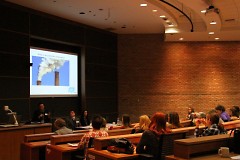
Attendees engaging in a panel discussion during the symposium /Courtesy of WMEAC

Attendees engaging in a panel discussion during the symposium /Courtesy of WMEAC
Two hundred people gathered at the Third Annual Women and the Environment Symposium held at Grand Valley State University's (GVSU) L.V Eberhard Center on Friday, February 7. The symposium was filled with community leaders, politicians, environmentalists and students, all brought together under the banner of empowering and educating women to improve the environment.
The event is hosted by the West Michigan Environmental Action Council and features two workshops, a keynote speaker, an award ceremony for women making key strides in environmental leadership and a panel discussion focusing on how women are influencing environmental policy.
Sandra Steingraber, PhD led the keynote address and spoke at length about her experiences as a women working toward improving environmental policies. Steingraber focused primarily on the effects of high volume hydraulic fracturing, or fracking, on the environment and women's health, and her efforts to ban it in New York. She told the story of spending 15 days in jail for blocking the driveway where a truck filled with thousands of gallons of fracking fluid was trying to leave.
"Fracking literally turns the world inside out. It is a shock and awe operation. Fracking involves the massive movement of material across state lines, millions of tons of sand which are mined from open pits, billions of gallons of water that exit the water cycle, millions of tons of radioactive drill cuttings which have to be buried in landfills somewhere, billions of gallons of brine and toxic wastewater, millions of diesel truck trips and thousands of compressor stations and condensers which are emitting volatile organic compounds including formaldehyde and benzene which are known to lead to birth defects and childhood leukemia," says Steingraber.
Steingraber approaches fracking from a human rights and health violation in addition to an environmental concern. She uses examples of toxic chemicals leaching into water supplies, and causing reproductive harm to women to showcase the human toll fracking can have.
"If you see fracking as ultimately a human rights violation and you feel morally obligated to speak out forcefully against it and turn scientific inquiry toward a course of public protection, then it leads you to ask for a ban. It leads you to say that regulations are a form of enablement and that I want no part of that, we're closing the door on fracking completely in Michigan," says Steingraber. "This shale is the Greensboro lunch counter for our generation."
Another central theme of the symposium was the challenge to women to become involved in local environmental issues, no matter their backgrounds. A panel discussion was comprised of women involved in the political arena, community organizing and various other roles. The participants interacted with the audience and placed a strong emphasis on volunteering, individual commitments and running for office as ways to be involved in directing environmental policy.
"Sometimes it's hard to figure out how to use your talents. A recurring theme throughout what everyone has been saying today is taking what you do, whatever it is, and applying it in the way you can and play your part that way," says Courtney Allen, a Biology and Environmental Science student at GVSU.
Throughout the symposium the speakers and panelists stressed the importance of collaboration between all parties passionate about environmental issues, regardless of their field.
"We are all working on the same issue but we all have different perspectives. Hearing people respond to those, whether it was in the workshop or from the keynote speaker, or just people asking questions, you really get a feel of how broad this issue touches the lives of all of us," says Nichea VerVeer Guy, a representative from United Methodist Women.
Steingraber acknowledged that environmental advocacy and policy surrounding environmental action has largely controlled by men in the past. She stressed the importance of women making their voices heard at the table and being actively involved in future environmental policy.
"We are all musicians in this great human orchestra. It really is time to play to save the worlds' symphony, you don't have to play solo, but you do have to know which instrument you play and play it as well as you can and find your place in the score," says Steingraber.
Disclosure: The author is currently an intern for WMEAC, in collaboration with The Rapidian's internship program.
The Rapidian, a program of the 501(c)3 nonprofit Community Media Center, relies on the community’s support to help cover the cost of training reporters and publishing content.
We need your help.
If each of our readers and content creators who values this community platform help support its creation and maintenance, The Rapidian can continue to educate and facilitate a conversation around issues for years to come.
Please support The Rapidian and make a contribution today.